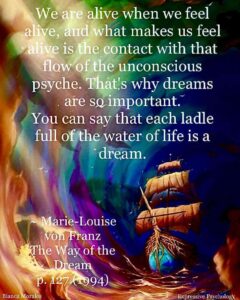It’s life that matters, nothing but life — the process of discovering, the everlasting and perpetual process, not the discovery itself, at all. ~Fyodor Dostoevsky. The Idiot
Any real change implies the breakup of the world as one has always known it, the loss of all that gave one an identity, the end of safety. And at such a moment, unable to see and not daring to imagine what the future will now bring forth, one clings to what one knew . . . or dreamed that one possessed. Yet, it is only when a man is able, without bitterness or self-pity, to surrender a dream he has long cherished or a privilege he has long possessed that he is set free—he has set himself free—for higher dreams, for greater privileges. ~James Baldwin. “Faulkner and Desegregation” in Partisan Review (Fall 1956); republished in Nobody Knows My Name: More Notes of a Native Son (1961)
Jung described Individuation as the process by which a person becomes a psychological individual, a separate indivisible unity who recognizes her/his unique identity. This happens as one integrates elements of the conscious and unconscious mind to become a whole person, a self-realized self.
Our purpose is to nurture the seed of our soul that was planted in our DNA at birth. Seeds strive to grow, blossom, and fulfill their purposes, whether to be a weed, a vegetable, a flower, a tree. So it is with us. The opus of our individuation produces something new and good, something of value to us and our communities.
I’ve been working on my opus since I was 17, although I didn’t know it until my 47th year. In last week’s post, “The Essential Thing is the Opus,” I wrote about aspects of it that I currently find difficult: impatience with the process, self-criticism for not being farther along, and a strong desire for closure.
In response to a reader’s comment about that post, I wrote: “I know that all I really need to do is stay open and accept whatever form of otherness presents itself to me in the present moment, to allow it in, accept it as part of myself, and take the next step I have to take. Yet…it’s never enough and something in me always urges me forward. In itself, I don’t think there’s anything wrong with that. Maybe it’s just the life instinct.”
That evening I started reading When Breath Becomes Air. This beautiful and heartbreaking opus was written by Paul Kalanithi, a 39 year-old neurosurgeon with terminal lung cancer. In it he asks a big question, “What makes life worth living in the face of death?” This quote blew me away:
“Lucy and I both felt that life wasn’t about avoiding suffering. Years ago, it had occurred to me that Darwin and Nietzsche agreed on one thing: the defining characteristic of the organism is striving.” ~Paul Kalanithi
That morning I had written, “Yet…something in me always urges me forward…maybe it’s just the life instinct.” Here was the name of that something: Striving. This soul-affirming synchronicity brings me great comfort. I think I’ll always strive. It’s life that matters, and life is about striving. Striving to love each other, to communicate our truths, to learn how to live with faults and fear, to earn the rewards of work well done and to find meaning in it.
Our opus isn’t always pleasant. Our striving can cause enormous suffering. Ultimately that’s good, because suffering motivates us to keep growing into new spaces filled with potential that blesses our souls and communities. Paul Kalanithi always wanted to write a book, and his suffering motivated him to spend the last year of his life following his dream, striving to complete his opus, this magnificent book.
An hour ago I reached this point in my writing when my husband asked me to drive him to pick up his car at the dealer’s where it was being worked on. Returning home I turned the radio on to the jazz station. These were the lyrics of the song I heard: “Keep on striving. Keep on keeping on.”
Oh my. Synchronicities are another defining characteristic of the opus. Keep on striving. Keep on, keep on keeping on.
What dreams have you released that freed you to accept good new things? What do you strive for now? What synchronicities have affirmed or changed the direction of your individuation journey?
Image credit: Pinterest. John Pitre, Pacific Sunrise
Paper and E-book versions of The Bridge to Wholeness and Dream Theatres of the Soul are at Amazon. The Wilbur Award-winning Healing the Sacred Divide can be found at Amazon and Larson Publications.com. Jean’s new Nautilus Award-winning The Soul’s Twins, is at Amazon and Schiffer’s Red Feather Mind, Body, Spirit. Subscribe to her newsletter at www.jeanbenedictraffa.com.





